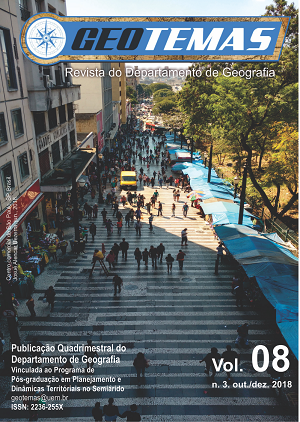The credit installation and the quality of life of seating in the Cearense Semiarid: reflections on public policies for rural development
Keywords:
Quality of life, Rural credit, The territory of the semiarid, Rural Settlements, Rural developmentAbstract
This essay aims to contribute to the current debate on contemporary rural development strategies in Brazil. It comes from bibliographic review and participant observation of the researcher in the dynamics of rural settlements in the Sertões de Canindé territory, located in the Semi-arid Cearense, between the years of 2012 to 2017. In the first section, we present the semi-arid territory of Ceará, where we also discuss the concept of territory used in the article. Next, we discuss the process of conservative modernization experienced in the Northeast, which influenced the dual character of public policies in the countryside, from the emergence of SUDENE to the current existence of two Ministries to deal with the Brazilian rural. In the third part, we present the credit facility, the public policy directed to the beneficiaries of the agrarian reform program for the purpose of installation and support to the beginning of productive activities of the settled families. We point out reflections on the processes of development and expansion of the freedoms and capacities of the subjects and the relation of access to credit with the improvement in the quality of life of the beneficiaries. The study points out the challenge, in the approaches on quality of life, to build social indicators from the subjects, listing what is important from their worldview.
Downloads
References
BRANDíO, C. A. Território e desenvolvimento: as múltiplas escalas entre o local e o global - 2 ed. – Campinas, SP: Editora da Unicamp, 2012.
BRASIL. Decreto n. 9424, de 26 de junho de 2018. Concessão de Crédito Instalação aos beneficiários do Programa Nacional de Reforma Agraria, Brasilia, DF, jun 2018. Disponível em: <https://presrepublica.jusbrasil.com.br/legislacao/594462369/decreto-9424-18>. Acesso em 10/09/18.
CARNEIRO, F. F.; KREFTA, N. M.; FOLGADO, C. A.R. A Práxis da Ecologia dos Saberes: entrevista de Boaventura de Sousa Santos. Tempus, actas de saúde colet, Brasília, 2014. Disponível em: <http://tempusacta.unb.br/article/download/1530/1289>. Acessado em 16/07/18.
CARNEIRO, M. J.; PALM, J. L.; ALVARENGA, A. C.. Informando política pública: uma revisão bibliográfica sobre Pronaf e qualidade de vida (2006-2013). Agricultura familiar brasileira: desafios e perspectivas de futuro, Brasília, p. 108-130,2017. Disponível em: <http://www.mda.gov.br/sitemda/sites/sitemda/files/user_img_1756/Agricultura%20Familiar_WEB_LEVE.pdf.Acesso em: 15 out. 2018.
CASTRO, I. E. de. Natureza, imaginário e a reinvenção do Nordeste. Disponível em:http://observatoriogeograficoamericalatina.org.mx/egal8/Geografiasocioeconomica/Geografiadelapblacion/08.pdf Acessado em 05/06/2014.
DEMIER, F.; DURIGUETTO, M. L. Democracia Blindada, contrarreformas e luta de classes no Brasil contemporâneo. Argumentum, Vitoria, v. 9, n.2, p. 8-19, maio/ago., 2017.
FERNANDES, B. M. Políticas públicas, questão agraria e desenvolvimento territorial rural no Brasil. In: GRISA, C.; SCHNEIDER, S. Políticas públicas de desenvolvimento rural no Brasil. Porto Alegre: Editora da UFRGS, 2015.
FURTADO, C. Formação econômica do Brasil. São Paulo: Companhia das letras, 2007.
FURTADO, C. Brasil, a construção interrompida. Rio de Janeiro: Paz e terra, 1992.
HAESBAERT, R. As Armadilhas do Território. In: SILVA, José B. da; SILVA, C. N. M. da; DANTAS, E. W. C.Território: modo de pensar e usar. Fortaleza: Edições UFC, 2016.
HAESBAERT, R. O mito da desterritorialização: do "fim dos territórios" a multiterritorialidade. 6 ed. -Rio de Janeiro: Bertrand Brasil, 2011.
LEFEBVRE, H.A produção do espaço. Trad. Doralice Barros Pereira e Sérgio Martins (do original la production de l´espace. 4 ed. Paris: Edition Anthropos, 2000). Primeira versão: início – fev. 2006.
LIMA JUNIOR, F. do O"™ de. SUDENE e forças sociais nordestinas. Crato (CE): RDS, 2014.
MARTINS, G. I.; SOUZA, A. F.G.de. A relação campo e cidade: Novas urbanidades e ruralidades, definições e (re) definições. Revista Online Caminhos de Geografia, 2010.
OLIVEIRA, F. de. Elegia para uma Re(li)gião: Sudene, Nordeste. Planejamento e conflitos de classe. 6. ed. São Paulo: Editora Paz e Terra, 1993.
OLIVEIRA, F. de. Crítica a razão dualista: o ornitorrinco / Francisco de Oliveira. -1.ed., 4. reimpr – São Paulo, SP: Boitempo, 2013.
PLOEG, J. D. V. D. Camponeses e impérios alimentares: lutas por autonomia e sustentabilidade na era da globalização. Tradução Rita Pereira. Porto Alegre: Editora da UFRGS, 2008.
RAFFESTIN, C. Por uma Geografia do Poder. Tradução de Maria Cecilia França. São Paulo: ítica, 1993.
SANTOS, B.[org.]. Produzir para viver: os caminhos da produção não capitalista. Rio de Janeiro: Civilização Brasileira, 2002.
SANTOS, B. de S. A gramática do tempo: para uma nova cultura política. São Paulo: Cortez, 2006.
SAQUET, M. A. Abordagens e Concepções de Território. São Paulo:
Expressão Popular, 2007.
SEN, A. K. Desenvolvimento como liberdade. São Paulo: Companhia das Letras, 2000.
Downloads
Published
How to Cite
Issue
Section
License
Authors who submit their manuscripts to Geotemas declare that the work is an original article and has not been submitted for publication, in full or in part, in another national or international scientific journal or in another circulation vehicle. The authors also declare that they agree with the transfer of the copyright of the referred article to the magazine Geotemas (University of the State of Rio Grande do Norte), allowing for later publications, as long as the source of its publication is assured. Finally, they assume public responsibility for the article, being aware that any charges arising from a claim by third parties regarding the authorship of the work may apply to them.



















